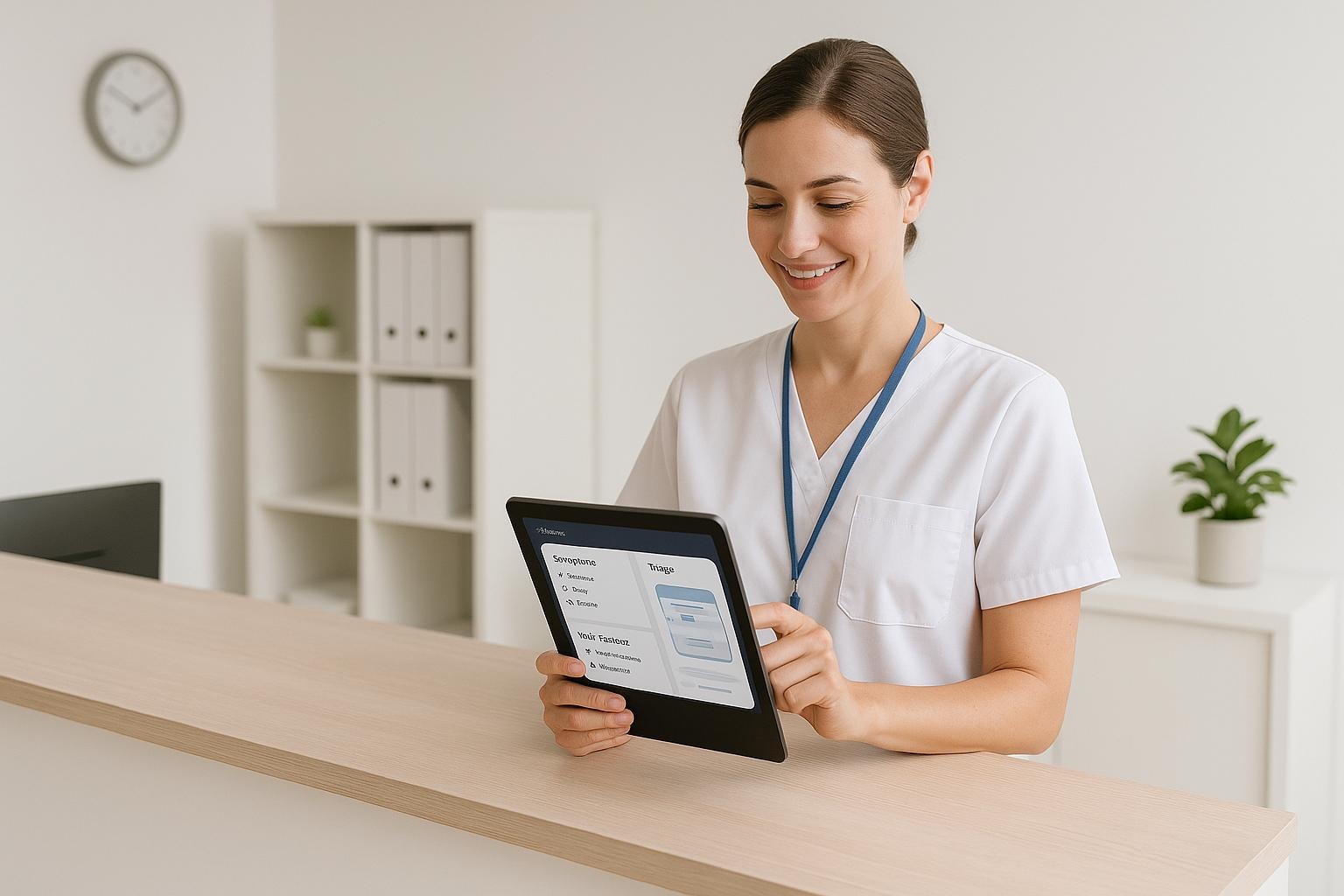
Best AI Triage Software for Small Clinics
Cut phone costs by 90% while improving patient care with AI systems that answer every call and handle routine tasks automatically.

Written by
Adam Stewart
Key Points
- Save 90% vs hiring staff with 24/7 AI call handling
- Boost call answer rates from 38% to 100% instantly
- Automate 85% of routine tasks like scheduling and refills
- Connects with 6,000+ apps including major EHR systems
Small clinics have a lot to deal with like few staff, lots of phone calls, and low cash. AI tools can help by doing jobs on their own, making patient visits smoother, and cutting costs. Here are five good picks for small clinics:
- Dialzara: A cheap AI phone helper ($199/month) that's there 24/7, handles calls, and works with over 6,000 apps.
- Talkie.ai: A smart AI voice helper ($1,500/month) that takes care of calls, speaks many languages, and works with top EHR systems.
- Mayo Clinic's Symptom Checker: A free tool that checks symptoms and gives advice on care, linked with Epic's MyChart.
- Patients Know Best (PKB): A system where patients can keep their health records safe and share info. You have to ask how much it costs.
- Epro: A digital system for sorting patients and managing them with good system links. You have to ask how much it costs.
Quick Comparison:
| Software | Monthly Cost | Key Features | Best For |
|---|---|---|---|
| Dialzara | From $199 | 24/7 call help, set meeting times, EHR link | Clinics that want cheap phone help |
| Talkie.ai | $1,500 | Works in many tongues, handles 85% of simple tasks | Clinics with hard work setups |
| Mayo Clinic's Symptom Checker | Free | Checks signs, gives care tips, links with MyChart | Clinics that want no-cost help at start |
| Patients Know Best (PKB) | Ask for cost | Safe patient files, ways to talk | Clinics that put first talking to people |
| Epro | Ask for cost | Digital sort-out, EHR link, works all the time | Clinics that must mix many systems well |
AI tools can make work fast, cut costs, and better patient care in clinics. Pick ones that fit your clinic's needs, money, and old systems.
1. Dialzara
Dialzara is an AI-powered virtual phone answering service tailored for small clinics. It automates patient calls, streamlines inquiries, and simplifies appointment scheduling. Let’s take a closer look at how its features help clinics operate more efficiently.
24/7 Availability
One of Dialzara’s standout features is its ability to handle patient calls around the clock. The AI receptionist works nonstop, ensuring no call goes unanswered - even during off-hours. Plus, it can manage multiple calls at once, making it invaluable for clinics with limited staff resources.
Seamless Integration
Dialzara connects effortlessly with over 6,000 apps via Zapier and integrates with key tools like Electronic Health Record (EHR) systems, practice management software, and scheduling platforms.
"DialZara automates inbound phone calls with lifelike AI, answering calls 24/7, delivering instant summaries, and integrating with over 6000 applications through Zapier for powerful post-call workflows."
These integrations allow Dialzara to automatically update patient records, manage schedules, and route messages to the right team members. This reduces administrative workload and lowers the chances of errors.
Budget-Friendly Options
For clinics operating on tight budgets, Dialzara offers flexible pricing plans to fit different needs:
- Business Lite: $29/month
- Business Pro: $99/month
- Business Plus: $199/month
By automating call handling and routine tasks, clinics can save up to 90% compared to hiring additional staff.
Enhanced Patient Experience
Dialzara significantly improves how clinics interact with patients. Call answer rates have jumped from 38% to 100%, eliminating the frustration of unanswered calls or long wait times. Its lifelike AI understands medical terminology and mirrors the clinic's communication style, making it feel like a natural part of the team.
2. Talkie.ai
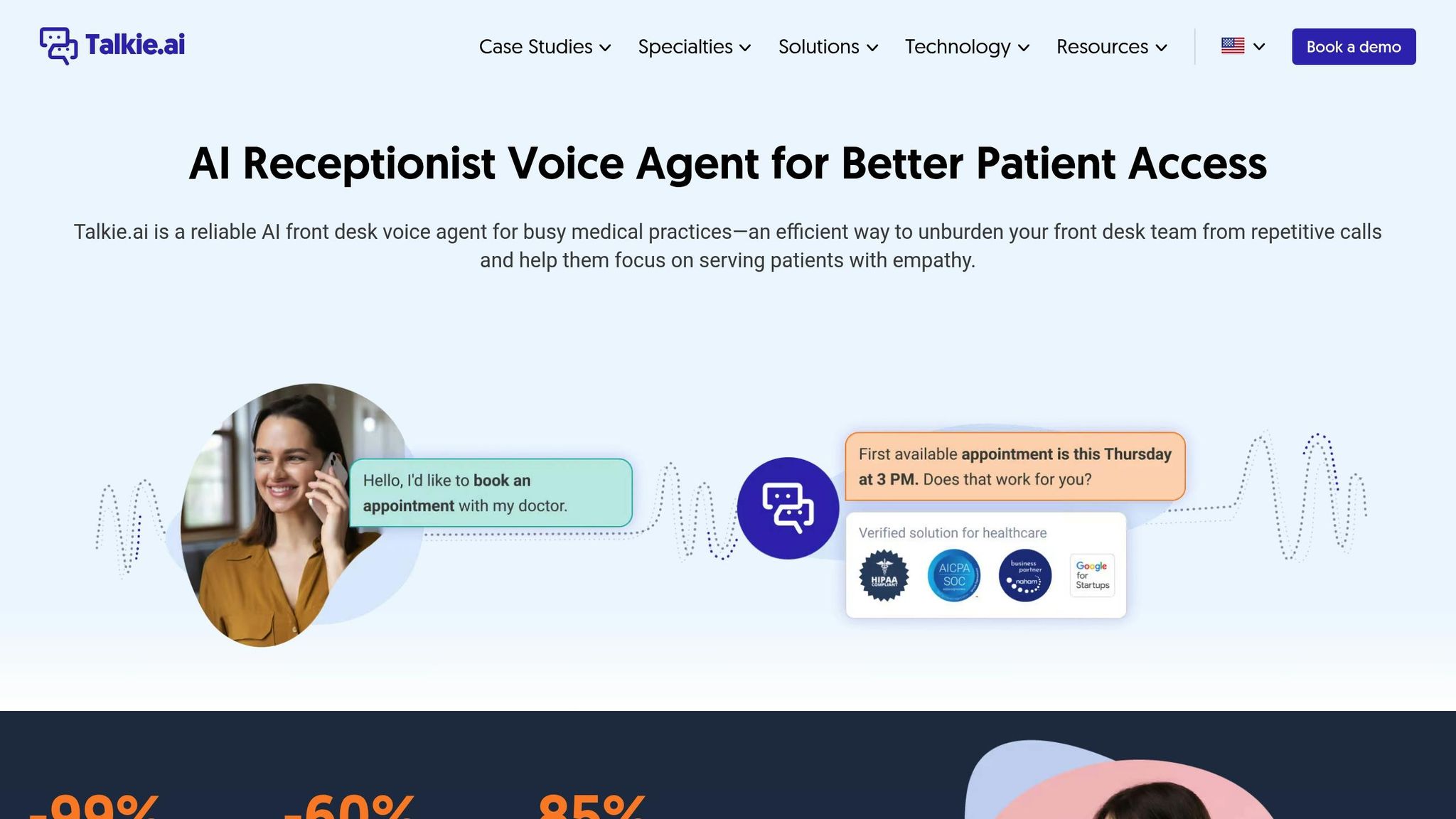
Talkie.ai is a smart AI voice assistant tailored for clinics with 5 to 100 employees, designed to automate patient calls and lighten the load on front desk staff.
24/7 Availability
With Talkie.ai, patient calls are never missed. This AI-powered system operates around the clock, handling up to 300 calls at the same time. It automates 85% of routine tasks, such as scheduling appointments, refilling prescriptions, and answering common questions. This means patients can quickly access essential services without delays.
"Talkie.ai is a virtual assistant to my front desk team. That's honestly how I describe it to other offices. Nurses sometimes have assistants, doctors have assistants - but the front desk team doesn't. Talkie.ai is that assistant to the front desk team." - Ashley Glisson, Senior Administrator at MHP Radiation Oncology Institute
Integration Capabilities
Talkie.ai smoothly connects with leading Electronic Health Record (EHR) systems like Epic®, AthenaHealth, eClinicalWorks, and ORACLE Cerner®. It also integrates with ModMed EMA, catering to specialties such as dermatology, urology, orthopedics, OB-GYN, and pain management. These integrations allow for real-time, two-way data exchange, minimizing manual data entry and keeping patient records up to date. This streamlined connectivity makes it easier for clinics to manage operations while improving patient care.
Cost-Effectiveness
Priced at $1,500 per month, Talkie.ai significantly reduces call center expenses by 60%, slashes on-hold times by 99%, and achieves an impressive 87% satisfaction rate. For clinics dealing with frequent staff turnover, Talkie.ai ensures uninterrupted service, unaffected by staffing challenges.
"We've been working with Talkie for over a year, and during this time, the solution has continued to evolve with new automation, reporting, and integration features. Talkie helped us during times of high staff turnover - it was always available." - Ashley Rapoza, COO Operations Manager at Hawaii Dermatology & Plastic Surgery Centers
Patient Interaction Quality
Beyond its operational perks, Talkie.ai enhances patient care with multilingual support, making it easier to serve diverse communities.
"Talkie.ai has been a useful tool in reducing staff workloads and increasing our efficiency in answering calls. Patients are now able to submit refill requests, schedule appointments, and receive other vital information without having to speak to a staff member." - Family Nurse Practitioner, Family Care Practice
3. Mayo Clinic's Symptom Checker
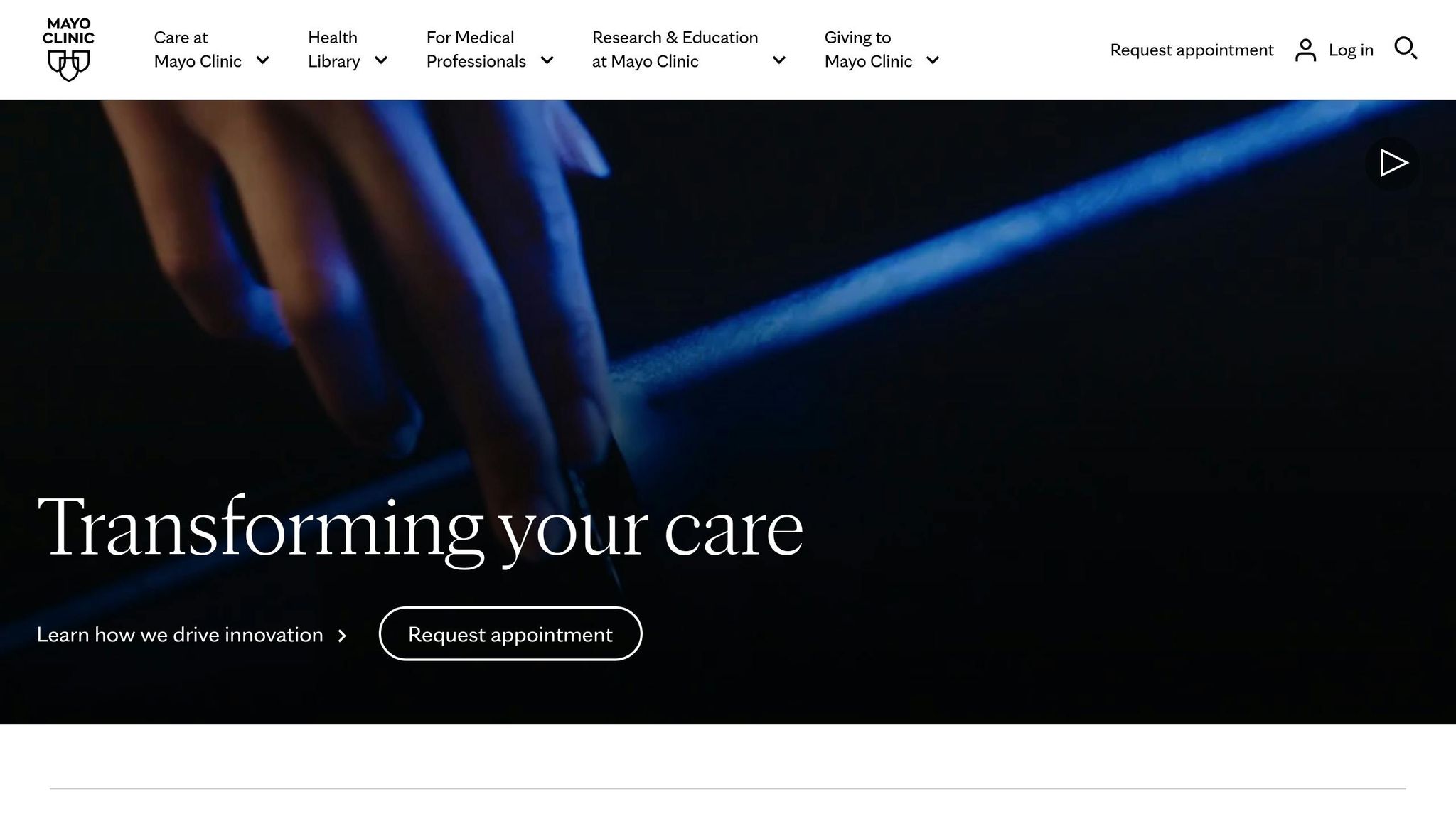
Mayo Clinic's Symptom Checker is a free tool made to check more than 300 signs using 36 smart ways. It helps both clinics and people figure out the right kind of care they need for different health worries.
24/7 Ready to Use
You can use this tool any time, giving help when it's late or for non-urgent health needs. It fills in when clinics are closed, cutting down on needless trips to the ER.
"Ask Mayo Clinic online offers trusted and accessible care guidance when you need it - anytime, anywhere", said Sandhya Pruthi, M.D., a physician in the Division of General Internal Medicine and associate medical director at Mayo Clinic Global Business Solutions.
The Symptom Checker takes you through many questions about how you feel and gives you advice based on your answers. You might be told to get help right now, see a doctor soon, or take care of it at home.
Easy to Work With
In 2017, Mayo Clinic and Epic Systems made it so the Symptom Checker could be used in Epic's MyChart. Now, if your health place is part of this, you can use the tool right from your MyChart under the "Ask Mayo Clinic" part. This helps doctors see your health info all in one place, making things run smoother and helps them work together better.
Saves Money
The Symptom Checker is free to use. This helps clinics save money. People in some places with a Mayo Clinic main doctor can use the tool through the Mayo Clinic portal. Even though not all can use it, the ones who can do not have to pay anything.
Better Talks with Patients
The tool uses good, known info from Mayo Clinic to give you advice. It looks at over 300 feelings and issues, so it gives you a good check-up. Since it works with MyChart, it's easy for people who are already using MyChart to keep their health info in check. This makes people use health apps more.
4. Patients Know Best
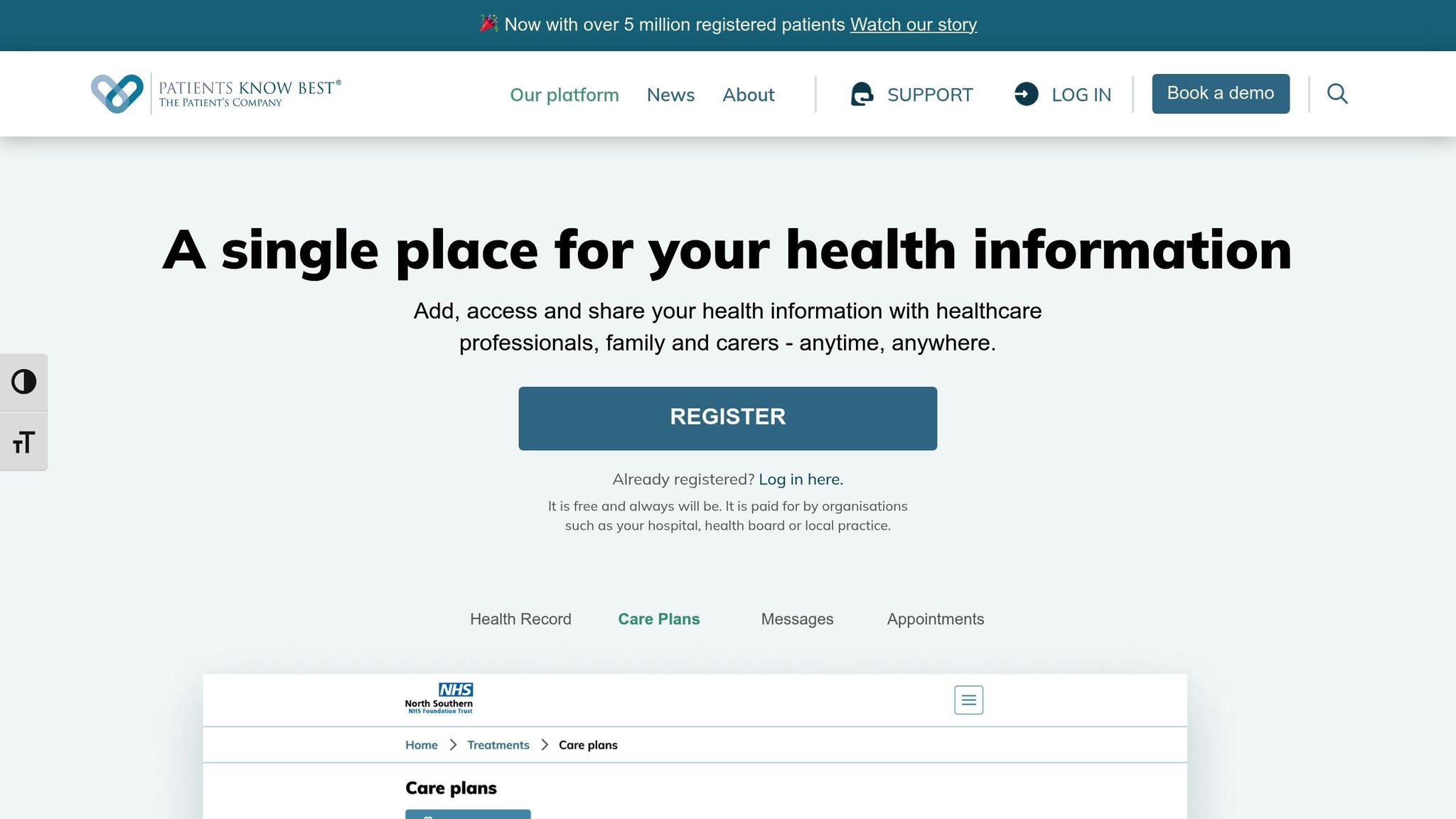
Patients Know Best (PKB) is a tool for health records built to make patient talks and care easier. It holds health records for over 10 million people in the UK, giving a safe web spot that brings together info from many places. This is very good for small clinics that want to handle their patient talks well.
24/7 Access to Health Info
PKB lets you get to key health info all day and night, like test outcomes, papers, notes, and times to see the doctor. Each month, the tool deals with 20 million test results and gets 100,000 new people, showing it works well and more folks trust digital health ways.
Easy Mix with Health Care Systems
PKB was made to mix well with both old and new systems using HL7, REST, and FHIR APIs. It links with all GP spots in England and one-fourth of UK hospitals, and it helps NHS Login for easy single sign-on too.
"FHIR provides a comprehensive universal standard which sits at the heart of the NHS interoperability strategy, eliminating the financial and resource burden of repeated integration cycles with bespoke, proprietary APIs", explained Daniel Whiteley, Developer at Patients Know Best.
The real effect of the platform is clear. For example, Hull University Teaching Hospitals cut down the time to handle repeat prescription requests by 75% using PKB questionnaires. In the same way, Chelsea & Westminster Hospital’s Heart Failure team used PKB tools for watching patients from afar, cutting down a lot on unplanned visits to the hospital for older patients with heart failure. These cases show how PKB makes care more smooth and saves money.
No Cost at Point of Care
PKB is free when you get care, so smaller clinics don't have to worry about costs. A good case is the University Hospitals of North Midlands NHS Trust, which used PKB for sending patient referrals. This method saved a lot of admin time, took away the need for more staff, and beat their top records in referral numbers.
Making Patient Engagement Better
PKB not only cuts costs but also makes it better for patients to use their health data. Surveys show that 72% of patients feel they know more, really liking being able to see radiology reports, test results, and details about appointments.
One English NHS Foundation Trust Hospital used PKB to change care for stable patients with inflammatory bowel disease. By making talks better and making the best use of visits outside the hospital, the platform let doctors use their time and tools better.
sbb-itb-ef0082b
5. Epro
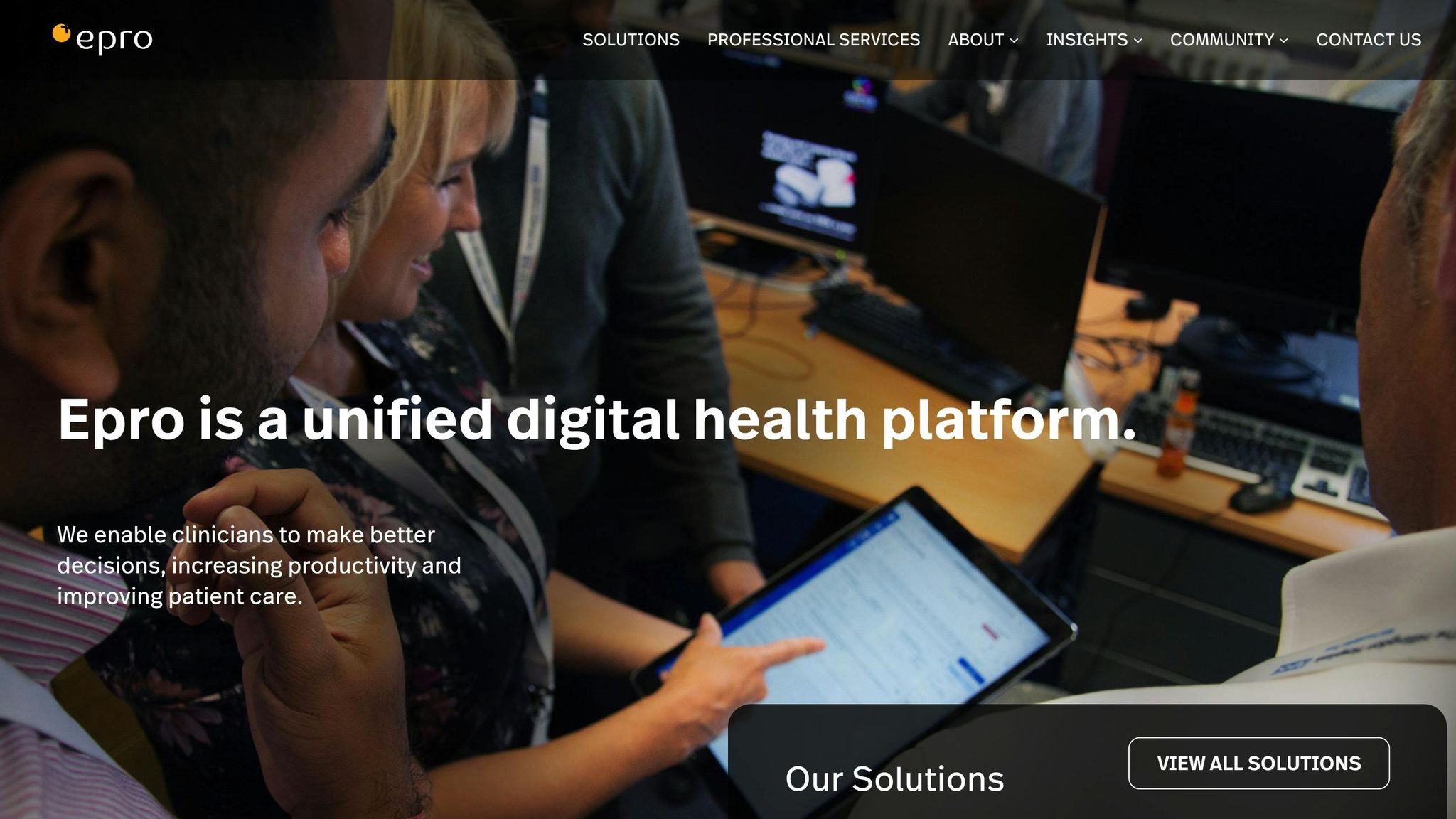
Epro builds on smart triage ideas and turns them into a full digital tool made to ease clinic tasks and make patient care better. It's made for small health clinics to help them run smoother and work better.
24/7 Availability
Epro is up almost all the time, showing 99.99% uptime during work hours and 99.95% at other times. This trusty uptime gets help from a go-to tech person and many ways to get support, like a customer site, email, and phone. Every setup gets a tech guide to make sure it all works well.
Integration Features
Epro links well with Patient Admin Systems (PAS) and Electronic Patient Record (EPR) systems via HL7, NHS mail, and other ways. It puts patient data from PAS and EPR systems in one place for an easy view. It also lets patients see their own records, which cuts down the paper tasks.
Cost-Effectiveness
Turning old paper tasks into digital steps saves time and cuts costs. This change lets staff focus on big tasks, lifting overall work power.
Better Patient Talk
With its Digital Outpatient part, Epro improves how clinics talk with patients. Patients can reach their health data safely, which lowers paper tasks and helps clinics work better.
Checking Prices and What You Get
When picking the right AI help program for a small health spot, you need to look at what it does and how much it costs. The table below lays out the price, main things it can do, and best uses for a few well-known choices:
| Software | Monthly Cost | Key Features | Best For |
|---|---|---|---|
| Dialzara | From $199 | AI phone help all day, set up meets, screen calls, works with over 5,000 apps | Clinics that need full phone help |
| Talkie.ai | $1,500 | Top AI chat, talks many tongues, helps with clinic choices | Big places with many care steps |
| Mayo Clinic's Symptom Checker | Free | Checks symptoms well, gives good medical advice | Small clinics that want strong basics |
| Patients Know Best | Ask for price | Lets patients see records, helps with care, shares info | Clinics that want to work well with patients |
| Epro | Ask for price | Always works well, links well with HL7, keeps digital patient files | Clinics that need strong link-up with systems |
For small clinics with tight budgets and more patients, these tools help in many ways.
Dialzara has a low $199 monthly price, good for setting up calls, booking times, and checking calls. It also works with over 5,000 business apps, making it a good fit for clinics that want to make talking easier without spending a lot. The more costly Talkie.ai, at $1,500 a month, gives top AI help, like help in many tongues and tools to help make clinical choices, great for big groups with tough needs. For clinics just trying out AI help, Mayo Clinic's Symptom Checker is a free, solid pick based on real check-ups, but it's not as full as paid options.
Each tool fits certain needs. For example, Epro aims for easy system mix, with near-perfect uptime and HL7 match, ensuring smooth links with health records and clinic systems. This makes it a top pick for clinics that value trust and tech mix.
AI help tools also make patient care better. Studies show they can cut waiting time for treatment by up to 20% and drop wrong triage rates to 0.9%, from 1.2% with old ways. For small clinics, easy-to-use setups, smooth mix, and help in learning are key.
End Thoughts
Picking the right AI triage tool can truly change things for small clinics. It makes looking after patients better and managing work easier. The AI in healthcare is booming super fast, expected to jump from $26.57 billion in 2024 to about $187.69 billion by 2030. This comes from a growth rate of 38.6% each year. This shows how key AI tools are becoming in healthcare.
For small places, picking the right tool means it must fit with what the clinic needs, work well with what systems are already there, follow rules, and make your team trust it. How much it costs is very important - building your own AI can cost $250,000 to $500,000, while using ready-made ones can cost $100,000 to $500,000 each year. Mixing costs with what the tool does is key to choose well.
AI tools can help when there are not enough staff and lessen wait times for patients. They offer choices for all kinds of money plans but still keep key features. The price list we showed earlier can help you see what matches your clinic's needs with what you can pay.
Start with small steps by using it for things that aren't so risky and slowly do more as your team gets used to the tech. The right AI choice can make looking after patients better and smooth out the way things run, all while keeping the care personal as it should be.
FAQs
What should small clinics check when picking AI triage tools?
When picking AI triage tools for a small clinic, the top need should be its skill to rightly judge signs and help in sorting out patient care. This can make things run better and lift patient results. It's also key to pick tools that mesh well with your present electronic health records (EHR), making sure work flows well and data moves smoothly.
Other things to think about include ease of use, the chance to shape the tool to fit your clinic's own needs, and sticking to health rules like HIPAA. Go for options that give good predictive power to help make smart clinical choices and use resources in the best way. These traits can help your clinic save time, lower costs, and make patients happier.
Summarize with AI
Related Posts
AI in Patient Education: Benefits for Healthcare SMBs
AI tools enhance patient education for healthcare SMBs, improving communication and reducing costs while meeting diverse patient needs.
HIPAA-Compliant AI Phone Agents for Healthcare
Explore how HIPAA-compliant AI phone agents enhance patient communication, ensuring security and efficiency in healthcare interactions.
Medical AI Training: Tips for Small Businesses
Enhance patient care in small medical practices by training AI to handle calls, streamline communication, and ensure compliance with regulations.
AI in Healthcare: Improving Patient Communication
Explore how AI enhances patient communication in healthcare by simplifying medical jargon, providing 24/7 support, and personalizing interactions.
